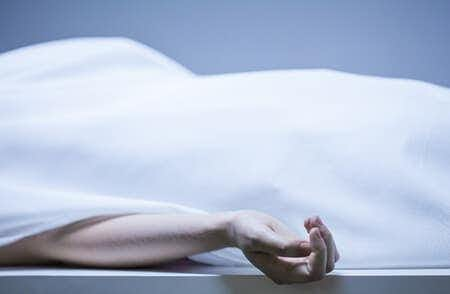Background
Defendant Mark Unger was on the deck with the victim, Florence Unger, on the evening of October 24, 2003. Defendant told the police and several family friends that sometime after dark, the victim had asked him to go back to the cottage and check on the two children. Defendant explained that he walked back to the cottage, put the children to bed, and returned to the deck. Defendant told the police and several friends that the victim was not on the deck when he returned, but that he presumed that she had gone to speak with one of the neighbors. Defendant maintained that he then returned to the cottage and fell asleep watching a movie.
About 12 feet below the surface of the rooftop deck, an area of concrete pavement extended from the boathouse wall to the edge of Lower Herring Lake. The police observed a large bloodstain on the concrete paving. There was no trail of blood between the bloodstain on the concrete and the edge of the lake. The railing surrounding the rooftop deck was noticeably damaged.
Defendant was arrested and charged with first-degree premeditated murder. At the preliminary examination, Dr. Stephen D. Cohle testified that the victim had died of traumatic brain injuries sustained upon impact with the concrete pavement. In contrast, Dr. Ljubisa J. Dragovic opined that the victim had not died from head injuries sustained upon impact with the concrete, but had drowned after being dragged or moved into Lower Herring Lake. The district court excluded Dr. Dragovic’s opinion testimony and determined that there was no admissible evidence of premeditation. Defendant was therefore put on trial for a charge of second-degree murder.
Unlike the district court, the circuit court ruled that Dr. Dragovic’s expert testimony was admissible. Accordingly, the circuit court allowed the prosecution to reinstate the charge of first-degree premeditated murder. The defendant was denied bail and the case proceeded to trial. The prosecution argued that defendant had kicked or pushed the victim over the railing, and had then moved the victim from the concrete pavement into the lake in an effort to drown her. The prosecution relied heavily on the testimony of Dr. Dragovic and other expert witnesses. In response, the defense maintained that the victim’s death had been accidental and that the victim had died of traumatic brain injuries nearly immediately upon striking the concrete. The defense presented expert testimony to support its theory that the victim had accidentally fallen over the railing and had rolled, bounced, or otherwise inadvertently moved into the lake. After an extensive trial, the jury convicted defendant of first-degree premeditated murder. He was sentenced to life in prison without parole.
Expert Witness
Dr. Ljubisa J. Dragovic, the Oakland County medical examiner, was a witness for the prosecution.
Daubert Challenge
Defendant argued that the circuit court erred in ruling that Dr. Dragovic’s testimony was admissible pursuant to Rule 702 due to its lack of relevancy and reliability.
Conclusion
The Court disagreed with Defendant’s argument that the circuit court erred by in ruling that Dr. Dragovic’s testimony was admissible pursuant to Rule 702.
The Appellate Court found that the circuit court was correct in admitting Dr. Dragovic’s expert testimony at trial. The Michigan Appeals Reports revealed that Dr. Dragovic had been qualified as an expert witness in the fields of neuropathology and forensic pathology many times in the courts of Michigan. Moreover, the evidence presented at the Daubert hearing in circuit court made clear that Dr. Dragovic’s testimony was based on established methods in the fields of neuropathology and forensic pathology and that Dr. Dragovic had applied these methods reliably to the facts of the present case. Although Dr. Dragovic did not perform the autopsy in this case, he testified that he frequently consults and offers expert opinions with respect to cases in which he has not personally autopsied the victim. Dr. Dragovic based his opinions in the present case on the autopsy protocol, the autopsy photographs, various microscope slides, and numerous anatomical specimens that were sent for his examination. On the basis of all this evidence and his expertise as a board-certified neuropathologist and forensic pathologist, Dr. Dragovic concluded that the victim’s head injuries could not have caused sufficient brain swelling to result in neurogenicpulmonary edema, and that the victim therefore must have died as a result of the intervening mechanism of drowning.
The Court noted that Dr. Dragovic’s inability to specifically identify any medical or scientific literature to support his conclusions in this case did not necessarily imply that his opinions were unreliable, inadmissible, or based on “junk science”. Not every particular factual circumstance can be the subject of peer-reviewed writing. There are some cases that raise unique facts and have not been previously discussed in the body of medical texts and journals. The Court also believed that Dr. Dragovic’s testimony should not be rendered inadmissible merely because certain experts disagreed with it. The Court acknowledged that there was disagreement among the expert witnesses concerning the victim’s cause of death, and this could be addressed by the Defense counsel during cross examination. After all, when expert witnesses offer conflicting opinions, it is solely for the jury to determine which expert is more credible.
The Court also found that the circuit court properly focused on the scientific validity of Dr. Dragovic’s methods rather than on the credibility or soundness of his particular opinions. As the circuit court properly recognized, Dr. Dragovic “didn’t use bizarre methods, he didn’t use strange methods . . . . He used standard methods of forensic pathology in coming to a conclusion with which defendant disagrees.” The circuit court concluded that Dr. Dragovic’s opinions were based on standard methods in pathology and that the issue of Dr. Dragovic’s credibility was for the jury to decide. The Appellate Court concluded that the circuit court did not abuse its discretion by qualifying Dr. Dragovic as an expert witness or by admitting Dr. Dragovic’s expert testimony concerning the cause of Florence Unger’s death.
About the author
Jared Firestone, J.D.
Jared Firestone, J.D., is a multi-disciplinary attorney with expertise in a range of legal areas. He founded and operated Firestone Law Firm PA in Hollywood, Florida, and worked as an Associate Attorney at Gustman Law P.C. in New York. His practice areas include Personal Injury, Criminal Defense, Medical Malpractice, Trusts & Wills, Civil and Commercial Litigation, Family Law, Real Estate, and Immigration. Additionally, he has experience in real estate, focusing on residential property in the Miami/Fort Lauderdale areas. Firestone also served as a pro bono Mediator at the Benjamin N. Cardozo School of Law Divorce Mediation Clinic. He holds a J.D. from Cardozo School of Law, where he honed skills in E-Discovery, Divorce Mediation, and Legal Writing, and a Bachelor’s degree in Philosophy from Tulane University.



